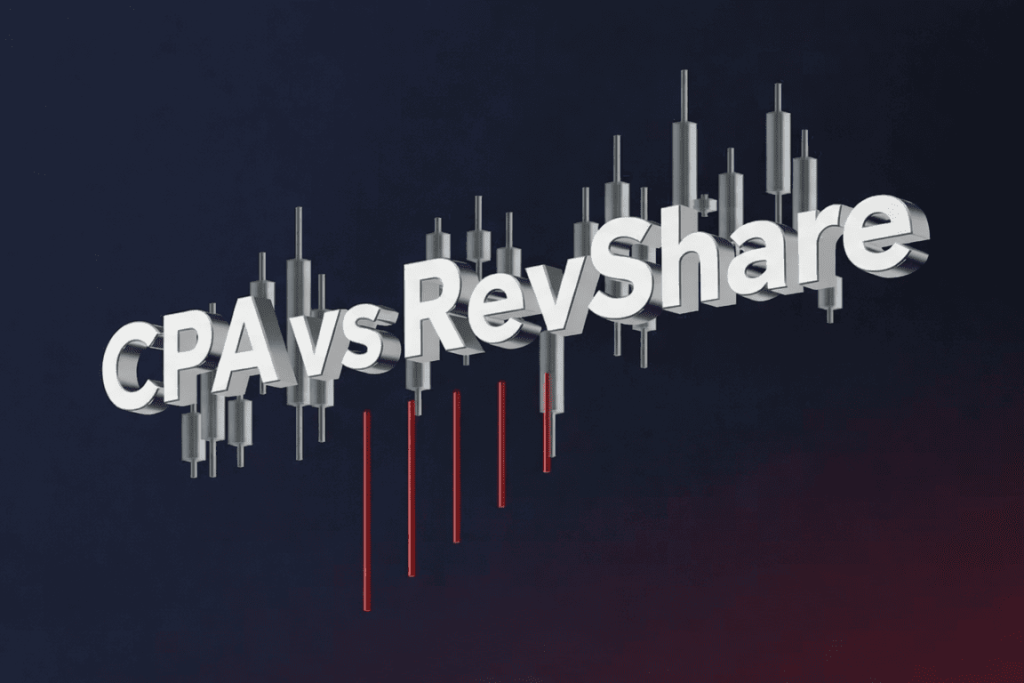
Understanding Dark Pools: Their Function, Criticisms, and Examples
Contents
Dark pools are private financial forums or exchanges that are primarily utilized by institutional investors to execute substantial transactions without immediate public exposure. Although dark pools shield large traders from market impact prior to deal execution, they have prompted apprehensions regarding market transparency and fairness. This article looks into the processes of dark pools, discusses their objections, and presents instances to demonstrate their function and significance in today’s financial markets.
Functionality of Dark Pools
Institutional investors, including mutual funds, pension funds, and large asset managers, are the primary beneficiaries of dark pools, which provide a discreet trading environment. They enable them to execute significant transactions away from the public eye. This section will delve deeper into dark pools’ operational nuances and strategic importance in modern trading.
Operational Mechanics
Fundamentally, a dark pool enables buy and sell orders to be executed without instantly public market disclosure. This is accomplished through a mechanism that does not display bids and offers before transactions are executed. Unlike public exchanges, where all market participants can observe every transaction and price shift, dark pools maintain a veil of secrecy around trading activity.
Orders placed within dark pools are typically matched internally, meaning that the trading system automatically pairs buy and sell orders at agreed-upon prices based on current market conditions without manual intervention. While not visible pre-trade, these prices are generally linked to the pricing available on public exchanges, often calculated as the midpoint between the best available bid and ask prices on these exchanges. This practice ensures that trades are executed at fair and competitive rates without contributing to immediate price movements in the broader market.
Strategic Advantages for Institutional Traders
The functionality of dark pools offers several strategic advantages to institutional traders. Primarily, the anonymity provided helps prevent large orders from influencing market prices adversely. For instance, if an institutional investor needs to sell many shares, doing so in a public exchange could signal to the market that this stock might be overvalued or that the investor expects its price to fall, precipitating the price decline the seller hopes to avoid. By concealing the order until it is executed, dark pools mitigate such market impact, helping maintain pricing stability and asset value during the transaction period.
Furthermore, dark pools help manage market risk associated with the time lag in executing large-volume trades. In a fast-moving market, prices can fluctuate significantly even in the short time it takes to execute a large order on a public exchange. By aggregating and matching similar-sized orders privately, dark pools can lock in prices that are insulated from the ticks of public market fluctuations during the order execution process.
Types of Orders in Dark Pools
By allowing a wide range of order types—including market, limit, and iceberg—dark pools enable a wide range of trading strategies:
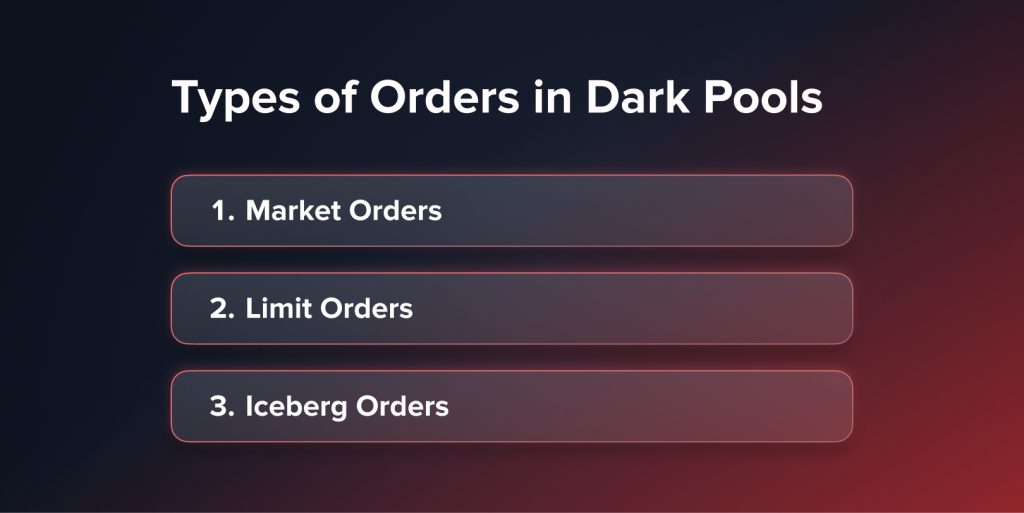
- Market Orders are executed at the best available price within the dark pool without exposure to the broader market.
- Limit Orders specify a maximum or minimum price at which the trader is willing to buy or sell. They offer control over execution prices but do not guarantee execution.
- Iceberg Orders involve the display of only a small part of a large order, with the rest hidden to avoid large-scale market reactions.
Technological Advances Impacting Dark Pools
Technological improvements have helped to improve dark pools’ usefulness, security, and efficiency. Dark pools are evolving to meet the demands of current financial markets by incorporating cutting-edge technology like as blockchain, artificial intelligence (AI), improved encryption, and seamless system integration.
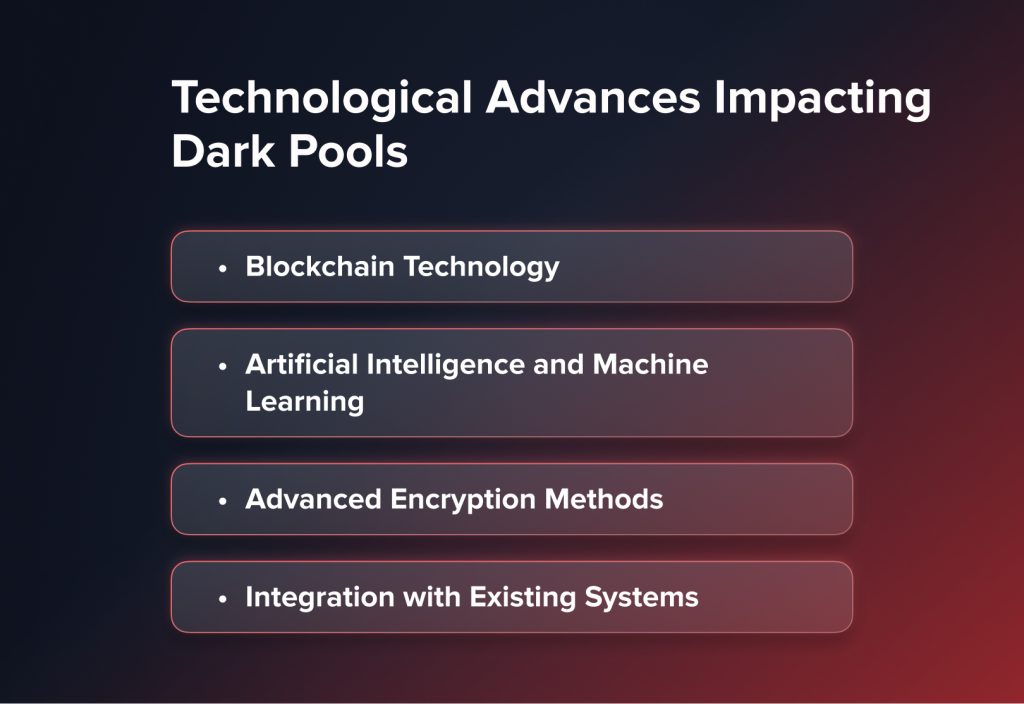
Blockchain Technology
One particularly promising use of blockchain technology is to improve dark pool openness while preserving required anonymity. Blockchain lets you safely record deals without disclosing particular information early on by using a distributed and unchangeable ledger system. This approach ensures that all transactions are traceable and auditable but does not compromise the privacy of the transaction until execution is complete. Such transparency is crucial not only for regulatory compliance but also for maintaining trust among market participants. Adopting blockchain in dark pools could revolutionize how trade data is managed, making it nearly impossible to alter or falsify without detection.
Artificial Intelligence and Machine Learning
AI and machine learning are transforming trade management and execution in dark pools by enabling more sophisticated data analysis and decision-making processes. These technologies can process and analyze large datasets faster than traditional methods, identifying trends and patterns that might indicate optimal trading opportunities or potential market manipulations. AI systems may, for instance, dynamically match big purchase and sell orders with little market effect, hence enhancing the efficiency and anonymity of significant transactions. Moreover, real-time monitoring of trading operations enabled by artificial intelligence helps to identify and stop predatory or fraudulent trading methods, therefore improving the general integrity and fairness of the dark pool trading environment.
Advanced Encryption Methods
Robust security measures are essential, given the high stakes in dark pool transactions. Advanced encryption technologies are crucial for ensuring secure connection and data sharing between traders and dark pools. The use of encryption protect all sent data, including trading orders and participant names, from unwanted access. This security feature is critical for securing sensitive information and preserving the secrecy that is essential to dark pools’ appeal.
You may also like

Integration with Existing Systems
Technological integration guarantees that dark pools work in harmony with the rest of the financial ecosystem. Advanced interfacing technologies and APIs allow dark pools to effortlessly integrate with current trading platforms and public exchanges. This link is critical for ensuring that dark pool activities are in line with real-time market circumstances and regulatory requirements. It also helps maintain accurate pricing by referencing real-time data from public exchanges, thus avoiding discrepancies that could affect market stability.
The ongoing technological evolution within dark pools is setting new standards for operational efficiency, security, and regulatory compliance. By leveraging blockchain for enhanced transparency, utilizing AI for improved trade matching and fraud detection, ensuring top-tier security with advanced encryption, and integrating smoothly with existing financial systems, dark pools are better equipped to serve the sophisticated needs of modern institutional investors. These technological improvements bolster dark pools’ functionality and help align their operations with the evolving regulatory landscape and ethical standards expected by the market participants.
Criticisms of Dark Pools
While beneficial for certain market participants, dark pools face substantial scrutiny and criticism for several reasons, particularly concerning market fairness and transparency. This expanded section explores the depth of these criticisms and their implications for the broader financial markets.
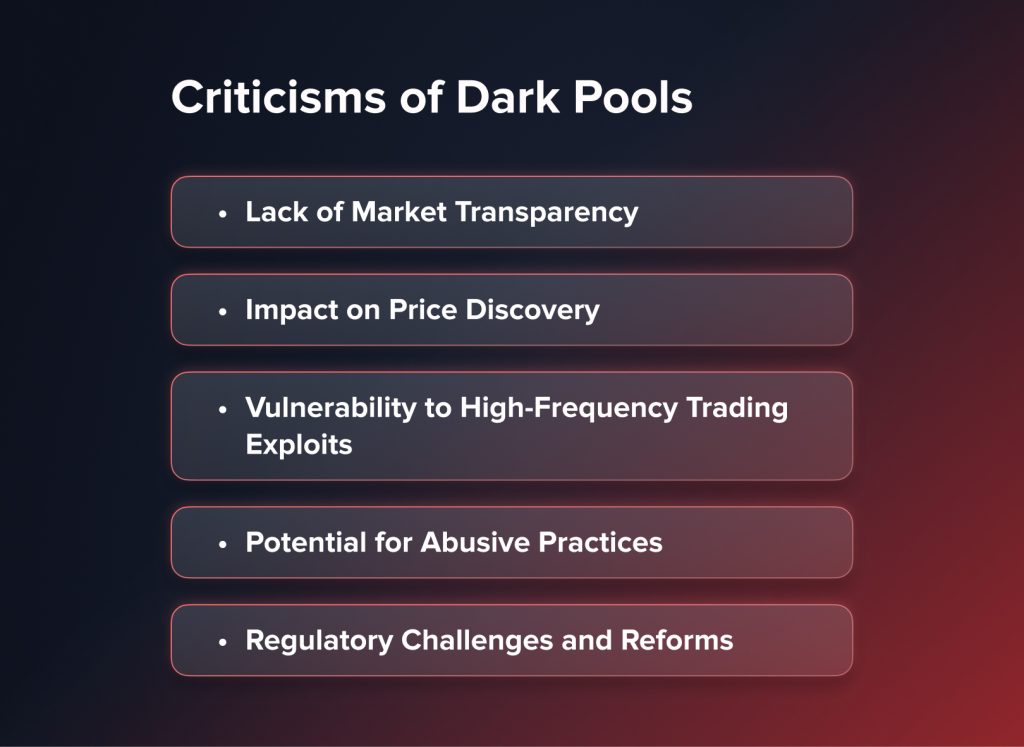
Lack of Market Transparency
The lack of transparency of dark pools is one of their main basic drawbacks. Dark pools run without revealing trade information until after deals are completed, unlike public exchanges where every transaction detail is visible to all participants. From a large fraction of the market, including individual investors without access to these secret trading platforms, this lack of disclosure may hide actual market activity. Critics contend that this might result in an unequal playing field when only certain players have a full perspective of market dynamics, therefore causing possible market inefficiencies and an impression of injustice.
Impact on Price Discovery
Dark pools can also impact the price discovery process. Dark pool transactions do not help to create real-time prices as they are concealed until after they are carried out. When a lot of the transactions in the market take place off public exchanges, this may especially cause issues as it can result in a difference between public market prices and real market values. This difference might cause the reflection of actual market circumstances to lag behind publicly observable pricing, therefore influencing the trading choices of all market players.
Vulnerability to High-Frequency Trading Exploits
High-frequency trading (HFT) firms often use sophisticated algorithms to analyze market data and execute trades at incredibly fast speeds. HFT strategies can exploit the opacity of dark pools in several ways. For instance, if HFT algorithms can infer that a large transaction will likely occur in a dark pool, they can trade ahead of these transactions in public markets to capitalize on expected price movements. This type of activity, often called predatory trading, leverages the information asymmetry created by dark pools and can lead to significant profits for HFT firms at the expense of other market participants.
You may also like
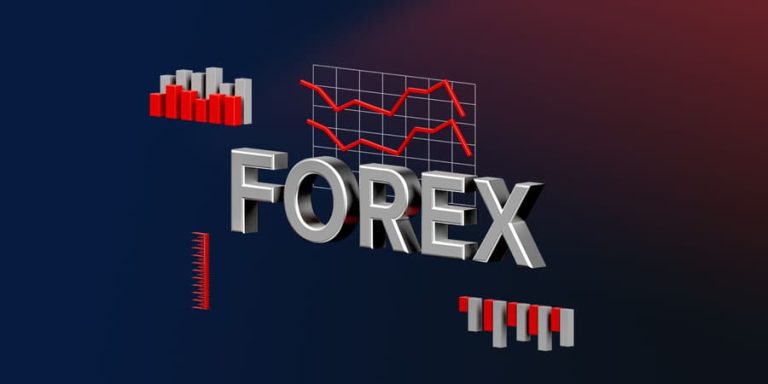
Potential for Abusive Practices
Potential abusive activities in dark pools have raised questions from the SEC and other regulatory agencies. Front-running is one such technique wherein a broker can utilize information of an upcoming significant transaction to execute trades in advance of that transaction, therefore profiting from the following price swings. While illegal, the secretive nature of dark pools can make such activities easier to conceal, thus posing challenges for regulators.
Regulatory Challenges and Reforms
As authorities try to reduce possible abuses and boost transparency, the environment for dark pools has been changing. For instance, the SEC has put regulations mandating more thorough disclosures on dark pool operations and trading nature into effect. Notwithstanding these initiatives, the difficulty still lies in striking a balance between the anonymity required by big institutional investors and the need of the market for justice and openness.
Examples of Dark Pools
Dark pools vary in ownership and operational structures, each serving distinct segments of the financial markets while offering various levels of privacy and service. This section delves deeper into the practical examples of dark pool operations, illustrating their impact on market dynamics and regulatory focus.
Operational Structures and Examples
Owned by major financial institutions, broker-owned dark pools like Goldman Sachs’ Sigma X and Morgan Stanley’s MS Pool facilitate client trades by leveraging the broader market’s pricing data. These platforms enable large institutional investors, such as mutual funds, to execute massive orders in increments without causing significant market impact. For instance, when a mutual fund needs to sell 1.5 million shares discreetly, it might do so in smaller parcels through a dark pool to prevent a drastic price drop, which is more likely if such a large sale were made public on traditional exchanges.
Independent dark pools offer similar functionalities but are not tied to a specific broker, providing a platform for a broader range of clients seeking privacy and less market impact. Meanwhile, exchange-owned dark pools, like those operated by the New York Stock Exchange’s Euronext, blend the infrastructure of a public exchange with the benefits of a dark pool, offering a unique mix of transparency and confidentiality.
Regulatory Scrutiny and Legal Challenges
Transparency and fairness have brought dark pools under major legislative scrutiny. In 2016, Barclays and Credit Suisse were embroiled in a prominent case which both companies allegedly preferred high-frequency traders in their dark pools, therefore violating the secrecy and protection provided to ordinary customers. The settlements – $70 million for Barclays and $84.3 million for Credit Suisse – were among the largest penalties for dark pool operations, highlighting the regulatory demands for increased transparency and fairness in these trading platforms.
Another important case included Investment Technology Group (ITG), which settled with the SEC for $20.3 million for its activities linked to the dark pool POSIT. Under the covert trading operation known as “Project Omega,” ITG was discovered to have exploited private data from its customers to carry out high-frequency trading operations benefiting ITG at its customer cost. Between 2010 and 2011, this violation resulted in one of the biggest penalties against an alternative trading system at the time, highlighting the possibility for abuse in dark pool activities and the necessity of strict supervision.
Conclusion
Dark pools are a difficult aspect of contemporary trade, weighing the advantages of anonymity and lower market influence against the hazards of reduced transparency. While they enable institutional traders to execute huge orders without rapid price depreciation, they also raise serious issues about market fairness and the possibility of exploitative conduct. As financial technology advances and regulatory scrutiny grows, the purpose and operation of dark pools may change. Understanding the operations, advantages, and dangers connected with dark pools is critical for both market players and spectators while navigating the larger environment of financial trading platforms.
Updated:
December 18, 2024
9 February, 2026
What Is a Trading Halt? Why Stocks Stop Trading and What It Means for You
A trading halt is when an exchange temporarily stops trading in a stock or, in rare cases, the entire market. It’s not a glitch and it’s not random. It’s a deliberate pause triggered when prices move too fast, critical information is about to be released, or regulators need time to step in. From the outside, […]



